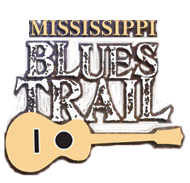Jimmy Rogers
Jimmy Rogers - Ruleville
Born James A. Lane at Dougherty Bayou just west of Ruleville, guitarist and vocalist Jimmy Rogers (1924-1997) played a pioneering role in the post-World War II Chicago blues scene. A member of Muddy Waters’ first band in Chicago, Rogers recorded the blues standards “That’s All Right,” “Chicago Bound,” and “Walking By Myself.” Ruleville’s row of juke joints on Front Street, known locally as “Greasy Street,” made the town a longtime center of blues activity.
Jimmy Rogers was a key player in the evolution of electric Chicago blues from its roots in acoustic Delta traditions. Born on June 3, 1924, Rogers—who took the surname of his stepfather—was raised by his grandmother in Vance, where he played in a harmonica quartet together with Snooky Pryor, who also later helped develop the new Chicago blues sound. Rogers took up the guitar in his early teens while living in Charleston and worked his first gigs in Minter City with Little Arthur Johnson. He performed in the Delta with his early idol Sonny Boy Williamson No. 2 (Rice Miller) and in the Memphis area with Howlin’ Wolf and guitarist Joe Willie Wilkins, an important influence. Rogers lived with relatives in Atlanta, Memphis, St. Louis, and South Bend, Indiana, before settling permanently in Chicago in the mid-1940s. There he fell in with leading artists including Memphis Minnie, Tampa Red, Big Bill Broonzy, and John Lee “Sonny Boy” Williamson (No. 1).
Rogers played for tips on Chicago’s Maxwell Street market with other newly arrived Southernmusicians including Pryor and harmonica player Little Walter Jacobs. Rogers introduced Jacobs toMuddy Waters, who had arrived in Chicago in 1943, and the three were soon performing together. Known informally as the “Headhunters,” the group developed a new and powerful ensemble sound that wasn’t fully captured on Waters’ recordings until the early ‘50s. Rogers made his first solo recording in 1946 for the Harlem label, but it was mistakenly credited to Memphis Slim. The first single to appear under his name came out on Chess in 1950. Rogers cut a dozen singles for Chess, and while only the 1957 release “Walking By Myself” reached the charts, others including “Ludella,” “Sloppy Drunk,” and, most notably, “That’s All Right” became oft-covered blues standards.
Rogers continued to play and record with Waters in the ’50s but also led his own band at times.He appeared as a sideman on recordings by Little Walter, Memphis Minnie, Sonny Boy WilliamsonNo. 2, Sunnyland Slim, Floyd Jones, Johnny Shines, T-Bone Walker, Howlin’ Wolf, and others. After playing for about a year in Wolf’s band, Rogers retired from music for eight years and ran a clothing store and taxi business. He returned to performing in 1969, and remained active as aperformer and recording artist until his death on December 19, 1997. Rogers’ influence on popular music was confirmed by the guests on his final album, Blues, Blues Blues, including Eric Clapton, Keith Richards, Mick Jagger, Robert Plant, Jimmy Page, Stephen Stills, and Taj Mahal. Rogers was inducted into the Blues Hall of Fame in 1995. Other Ruleville-born blues artists who moved to Chicago include vocalist Jeanne Carroll and bassist Hayes Ware.
content © Mississippi Blues Commission
[ BACK TO TOP ]

